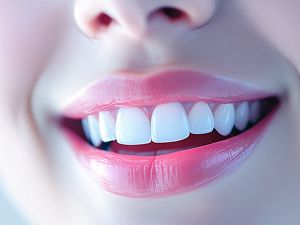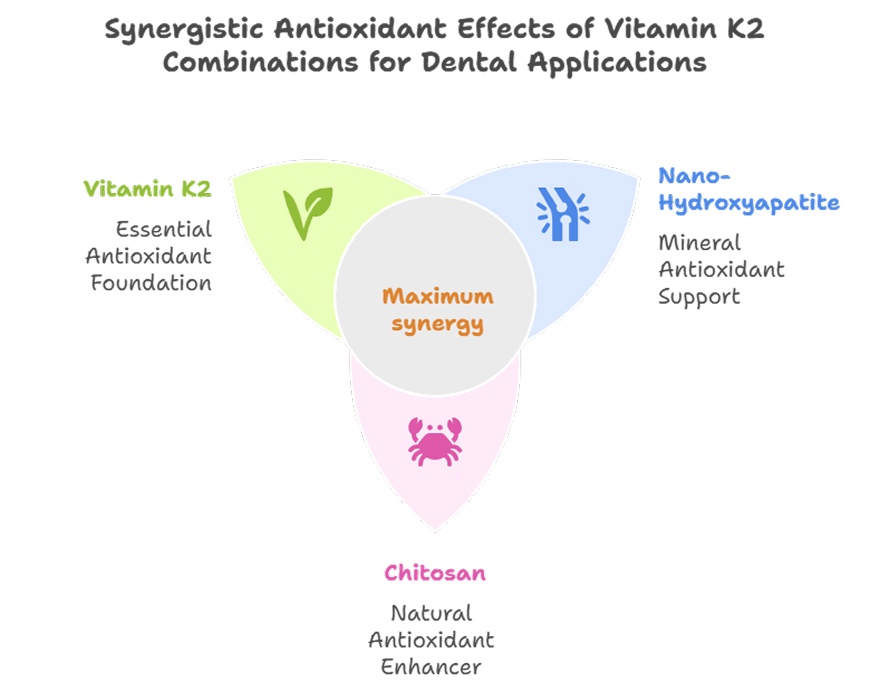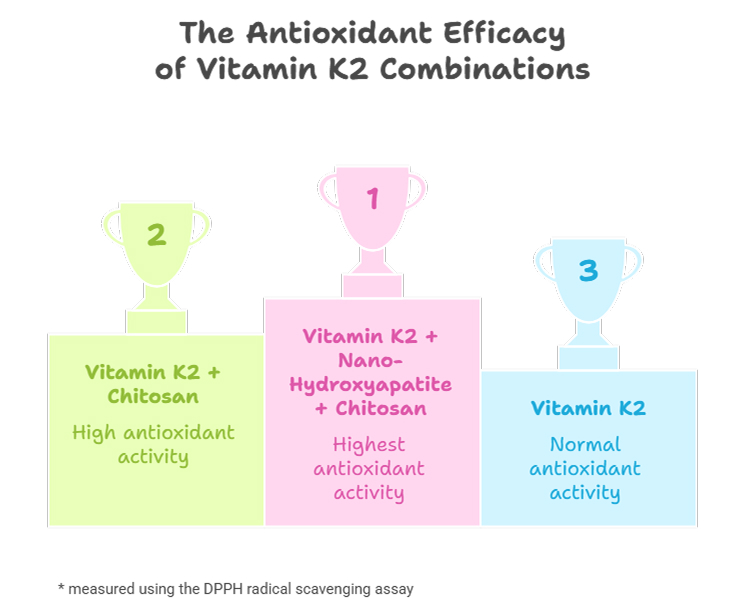dental health

Nanocomposites with Antioxidant Properties for Dental Applications
Nanocomposites with antioxidant properties are gaining increasing importance in biomedical and particularly dental research. These materials combine conventional substances with nano-particles, aiming to enhance mechanical, chemical, or biological performance. [1]
Benefits for Oral Health
Cell damage and oxidative stress – caused by socalled free radicals – also affect the oral cavity. Antioxidants help neutralize these harmful molecules and thus play a vital role in maintaining dental health.
One particularly promising compound is vitamin K2, which has anti-inflammatory properties and supports bone metabolism [2]. This contributes to the prevention of osteoporosis and tooth loss. In addition, there is evidence suggesting that vitamin K2 may help prevent or even reduce vascular calcification, which can have a positive impact on overall oral health. [3]
Recent studies further indicate that vitamin K2 may influence inflammatory processes in the gums. It may help regulate immune responses and reduce inflammation in the oral cavity through specific mechanisms. [2]
Research on Antioxidant Nanocomposites
A recent study examined the antioxidant effects of nanocomposites composed of hydroxyapatite, chitosan, and vitamin K2. Four different solutions were tested (Vitamin K2, Vitamin K2 combined with chitosan, Vitamin K2 combined with nano-hydroxyapatite and Vitamin K2 with both chitosan and nano-hydroxyapatite as a complete nanocomposite).
The antioxidant activity was measured using the DPPH radical scavenging assay, a wellestablished method for quantifying free radical activity. The results showed that the combination of vitamin K2, chitosan, and nano-hydroxyapatite demonstrated the highest antioxidant activity, followed by the variant with vitamin K2 and chitosan. [1]
Potential for Dental Applications
Due to their high antioxidant capacity, such nanocomposites are considered promising candidates for a variety of dental applications [4]. Potential uses include:
• Protective coatings for filling materials to reduce oxidative damage
• Implant coatings to support tissue healing
• Innovative oral care products designed to neutralize free radicals and promote oral health [5]
The findings suggest that nanocomposites combining vitamin K2, chitosan, and nano-hydroxyapatite offer an effective way to enhance dental materials. Further research is needed to identify the optimal formulation and application of these innovative materials. [1]
You can find a wide selection of chitosan products suitable for dental applications in our online shop. Feel free to contact us – we’ll be happy to help you find the perfect candidate for your project!
Beyond Antioxidants: Promising Antimicrobial Effects
In addition to their antioxidant properties, nanocomposites composed of vitamin K2, chitosan, and nano-hydroxyapatite have also demonstrated promising antimicrobial activity. Recent studies revealed that these materials significantly inhibit the growth of clinically relevant microbial strains. When used as a coating for dental implants, they offer a dual benefit: protection against oxidative stress and effective defense against bacterial colonization—both critical factors for longterm osseointegration and the preservation of periimplant tissue health. [6]
Summary:
A newly developed nanocomposite made from vitamin K2, chitosan, and nano-hydroxyapatite shows significant antioxidant and antimicrobial properties in vitro. Chitosan, in particular, plays a major role in the bioactive functionality of the material.
Key Findings:
• Highest antioxidant activity observed with the combination of vitamin K2 + chitosan + nano-hydroxyapatite
• Significant inhibition of microbial strains relevant to oral health
• Chitosan acts synergistically and additionally supports osseointegration in implants
• Suitable for dental applications such as implant coatings, filling protection, and bioactive oral care
References
1. Free radical scavenging activity of nano-hydroxyapatite (HA)/chitosan/vitamin K2 for biomedical applications | AIP Conference Proceedings | AIP Publishing, accessed 06.06.2025
2. Vitamin K2 as an Anti-Inflammatory Agent? – Biochemistry for Your Genetic Potential, accessed 10.06.2025
3. Torhaus – Your Dentists | Why Are K Vitamins Important for Dental Health?, accessed 10.06.2025
4. A Review on Nanocomposite Coatings in Dentistry | Journal of Materials Science, accessed 06.06.2025
5. Use of Antimicrobial Nanoparticles for the Management of Dental Diseases, accessed 06.06.2025
6. Assessment of Antimicrobial Activity of Nanocomposites Based on Nano-Hydroxyapatite (HAP), Chitosan, and Vitamin K2

Effects of the addition of chitosan in the base of dentures
Good dentures are becoming increasingly important as the population ages. Conventional materials for the base of dentures are often porous and thus susceptible to deformation or microbial colonization. To prevent this, chitosan is added to polymethyl methacrylate resin in the presented study.

Chitosan as protection against dental erosion
Dental erosion is the demineralization of the hard tooth substance caused by acids. Particularly in industrialized countries this is an increasing problem due to changes in drinking and eating habits in recent decades. Additionally, the teeth surface is eroded by mechanical interaction like brushing. To substantially reharden demineralized enamel, the development of appropriate prophylaxis and therapy is important. HMC presents two studies that tested toothpaste and mouth rinses containing chitosan.





